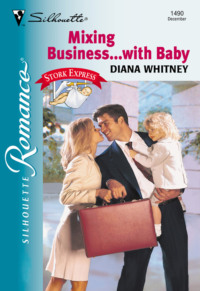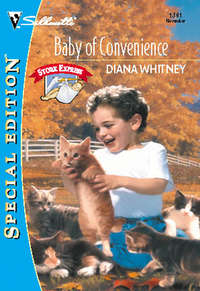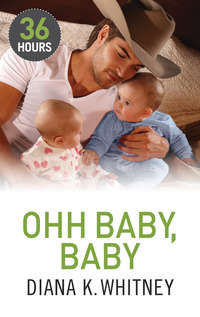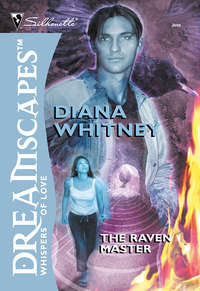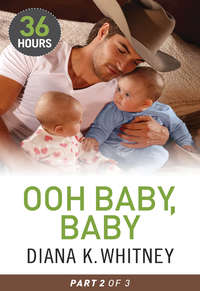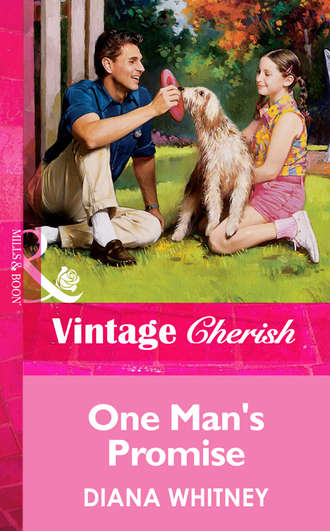
Полная версия
One Man's Promise
It was a generous offer. For a moment, Richard thought Lissa might actually accept. Instead, the child’s eyes narrowed with suspicion.
“I can do it all by myself.” Lissa spun, strode to the front door, paused with a triumphant gleam in her eyes. “Ragsy is my dog. He doesn’t need you anymore.”
“Lissa!” Richard flinched as the front door slammed, then faced the shaken woman rising to her feet. “I’m sorry.”
C.J. shrugged. “It’s all right. This has been difficult for her. I understand.” Oddly enough, he believed that she did. She raked a hand through her hair, took a deep breath, then suddenly fumbled in her slacks pocket and extracted a business card. “I’ll forward Rags’s things. If you have any questions or problems, you can reach me here.”
He absently glanced at the card, did a double take. “‘All That Jazz Academy of Dance’?”
“If I’m not there, that number will forward to my beeper.”
She licked her lips, blinked rapidly. Too rapidly. “Please give my regards to Lissa. Tell her I’m glad Rags found such a good home.”
“Ms. Moray—”
But she’d spun away, crossed the yard and was already climbing into her car. A moment later, she drove down the street and disappeared, leaving Richard both relieved and conflicted.
For the sake of a child she did not even know, C. J. Moray had relinquished all claim to the pet she clearly adored. He was grateful, of course, but he was also deeply saddened by the niggling sense that this might have been one battle his daughter should not have won.
“You just left him there?” Under the best of circumstances Bobbi Macafee was an imposing woman, tall, broad shouldered, with a thick mane of ebony hair and a horsey face that oddly enough was not unattractive. When perturbed, that face tightened into a furious mask, reddened like a neon beet and was frightening enough to have once cowed a professional wrestler, who’d unwisely refused to pose for a photograph, into hiding behind his trainer to escape her wrath.
Now Bobbi loomed large and intimidating, jammed her fists on her hips and gaped at C.J. as if she’d just confessed to abandoning an infant on a doorstep. “How could you do such a thing? I mean, Rags is family! You might as well have given up your own child!”
“There wasn’t any choice,” C.J. mumbled, retrieving the palm-sized glucometer from a kitchen shelf. She pricked her finger, smeared a blood drop on a test strip, which she inserted into a slot at the side of the machine. “That little girl loves Rags. She would have been devastated to lose him.”
“What about you?” Bobbi insisted. “Don’t your feelings count?”
“I’m a grown-up. She’s a child, a sick, lonely little girl who desperately needs love.” C.J. checked the digital readout for her blood sugar level, then put the glucometer away, measured a precise amount of orange juice into a glass and prepared a lean turkey sandwich for lunch.
Behind her Bobbi paced and fumed, ranting about the injustice of the world. C.J. ignored her. Although fiercely loyal and opinionated to the point of irksome, Bobbi was first and foremost a dear friend. They were like sisters, had been since their college days, and C.J. understood that the guilt of having been responsible for Rags’s loss in the first place weighed heavily on her roommate’s conscience.
Not that C.J. blamed her. Moving an entire household wasn’t easy, even for a woman who could bench-press two hundred pounds without breaking a sweat. It wasn’t Bobbi’s fault she’d been left to tackle the task alone. If anyone was responsible for Rags’s loss, it was C.J. herself. She should have been there to protect her precious pet during the move.
“You should sue,” Bobbi announced, nodding so vigorously that her spectacles slipped down her nose. “I know a lawyer—”
“No.”
“But the county was negligent! Honest to God, Ceejz, I called the shelter six times a day for two solid weeks after Rags ran away, and every dadgummed time they said no animal of that description had been picked up. They lied, they screwed up, they gave your dog away, for Pete’s sake! Someone has to be held accountable for that.”
Heaving a sigh, C.J. set the orange juice down. “No lawyers, no lawsuits. It’s over. I’ve made my decision. Rags is happy, well cared for, and loved. Please, can’t we drop it now? This entire subject is...painful.”
Bobbi’s face crumpled in despair. “Oh, hon—” She stepped forward, stopped when C.J. raised a palm to signal that she was perfectly fine and didn’t wish to be fussed over.
Of course, C.J. wasn’t perfectly fine and Bobbi clearly knew that. She also understood C.J.’s aversion to being the subject of worry or concern, and respected her silent request even if her furrowed brow displayed disagreement with it.
Frustrated, Bobbi straightened her glasses, heaved a deflating sigh. “Look, I have to go. The magazine is sending me out to interview an over-the-hill jockey who’s accusing some racing association of age discrimination.”
CJ. nodded without comment, took a bite of sandwich while her roommate hustled around the cluttered room gathering her briefcase, pocket recorder, camera and other tools of the journalistic trade.
Pausing at the front door, Bobbi shouldered the briefcase strap, raked red-tipped fingers through her thick tangle of long black hair and regarded her friend with blatant concern. “Are you going to be all right, Ceejz? I can reschedule this thing—”
“I’m fine,” C.J. assured her. “You go, do your job.” She enforced that edict with the brightest smile she could muster, and tipped the orange juice glass in salute. “Knock ’em dead, tiger.”
Bobbi responded with a thin nod, an even thinner smile, then slipped out the door.
Alone now, C.J. slumped against the kitchen counter, forcing herself to finish the tasteless sandwich. Eating was more ritual than pleasure. Her body required food whether she wanted it or not. At the moment, her stomach twisted, her head hurt and she was angry with herself for being so emotional.
The reunion with her beloved pet had been bittersweet. Although deeply grateful that Rags was alive and happy, the emptiness in her heart seemed suddenly overwhelming again. For the past six years that crafty canine had been her constant companion, from romps on the ski slope to ocean surfing excursions, and had even shared a hot-air balloon trip she and Bobbi had taken to research one of her roommate’s magazine articles.
Rags was the only creature on earth who accepted C.J.’s quirks without question. He never criticized, never furrowed a doggy brow with worry, never gave scolded warnings or repeated medication reminders. He was thirty fur-covered pounds of unconditional love and acceptance that C.J. desperately needed.
But little Lissa needed it more.
The Matthews child had put a mirror to C.J.’s own lonely childhood, a poignant reminder of how much a friend—even a shaggy canine friend—means to a sick and lonely little girl.
Since C.J. wouldn‘t—couldn’t—take that away, she set about fulfilling her promise to forward Rags’s possessions. Retrieving a box from her bedroom closet, she examined the contents. Tiny tags, still snugged on Rags’s collar ring; his old training collar and leash; special ointment for the skin condition that flared occasionally, along with a folder of medical records, all meticulously maintained from the day she’d brought him home as a feisty ten-week-old pup; his favorite chew toys, the plastic Frisbee he adored; a tiny wet suit for beach excursions, a warm saddle coat for snow trips; and of course, his beloved skateboard.
There were photographs, too, a record of their time together, of the adventures they’d shared. But the pictures were hers, and hers alone. All she had left were those images, and the memories they evoked. Good memories. Joyful memories.
Memories of mountain hikes and walks in the park, of the reassuring bed lump that always crowded her legs, of the rushed vet visit when a wasp had stung his tongue.
Memories of warm fur and a cold nose and wet, doggy kisses that made her sputter and laugh. Memories of friendship. Memories of love.
C.J. remembered it all, relived it all. And she smiled through her tears, content in the knowledge that there would be more memories of friendship and love created between a big-hearted pooch and the lonely little girl who needed him.
Chapter Two
“I can have the revisions done by the end of the week.” Shifting the telephone, Richard spread the curled blueprint over his drafting table, readjusted the corner tape to hold it flat. “The changes you’re suggesting shouldn’t have more than a minimal impact on cost—”
“Daddy!”
“But I’ll run the new specs through the computer and give you an update—”
“Daa-ddy!”
“In a day or so.” Richard sighed as Lissa stomped into the secluded den that served as his architectural office. “Listen, Jay, can I get back to you on this? Thanks.”
“Ragsy won’t play with me,” Lissa announced as soon as he’d cradled the receiver. “He won’t play dress-up or chase his ball or do anything ’cept sit on the back of Gramps’s chair with that dumb Frisbee in his mouth and look out the window.”
Richard swiveled on his drafting stool, and squeezed the back of his aching neck. As he opened his mouth to speak, one of a half-dozen antique clocks displayed throughout the office began to chime the half hour. Seconds later another chimed in, then another. The sound soothed Richard, offered a moment of calm retreat. He loved clocks, particularly the old ones, with rich embellishments, gilded etchings and intricate carvings crafted by long-ago artists who took pride in their work. His collection of such treasures was a source of great joy to him, and he could spend hours restoring a neglected piece to its original luster.
After a few seconds, the clocks fell silent, and Richard returned his attention to the sulking child beside his drafting stool. His voice was firm, but not particularly convincing. “Lissa, you know you’re not supposed to interrupt me while I’m working.”
She poked her lip out, folded her arms. “I want to play with Rags.”
Heaving a frustrated sigh, Richard motioned his daughter over, pulled her into his lap. “Rags doesn’t want to play right now, punkin. He’s feeling sad.”
Lissa’s lip quivered, then clamped in anger. “It’s that mean lady’s fault. Gramps even said so.”
With some effort, Richard kept an impassive expression. Thompson McCade was rich, powerful, smoothly controlling and as devoted to his grandchild as was the man’s timid, beleaguered wife. Richard considered his father-in-law a tyrannical bully, but had always kept that opinion to himself out of respect for his wife’s memory, and because he didn’t want to alienate Lissa from her grandparents’ love and attention.
Now, as always, Richard tried to straddle a fine line between supporting McCade’s inappropriate blame-mongering, and openly contradicting his daughter’s beloved Gramps. “I can understand your grandfather’s concern, punkin. He hates to see you upset. But you have to remember that Gramps hasn’t met Ms. Moray, so he’s really not in a position to comment on her motives. I believe she only wants what’s best for Rags, and for you, too.”
“I don’t care. I hate her.”
“That’s not a nice thing to say.”
“Well, I do hate her, I do. She’s trying to steal my dog and I just wish she’d dry up and die.”
“That’s enough.” Speaking sternly enough to startle his daughter into attention, Richard enforced his position. “It’s okay for you to feel bad, and it’s okay for you to be angry, but it’s not okay for you to say mean things about people even when they’re not around to hear them.”
“But it’s not fair,” Lissa wailed. “Ragsy is my dog.” Pulling away from her father’s embrace, the child leapt down, kicked at a cardboard blueprint tube lying beside the drafting table. “He was real happy before she showed up, and now he won’t eat or play or do anything at all. He’s no fun anymore, and it’s all her fault.”
After emphasizing her pique with another kick at the hapless mailing tube, Lissa spun on her heel and marched out. A moment later, her bedroom door slammed.
Richard pushed away the contract file with which he’d been working, leaned back on his stool and rubbed his eyelids until they stung. As annoyed as he was with his father-in-law’s interference, he still couldn’t blame Lissa for feeling helpless and frustrated, particularly when he felt that way himself.
Ever since C. J. Moray’s less than fortuitous appearance, Rags had shown every symptom of an animal grieving himself sick. The poor little dog had eaten nothing for four days now, and even the neatly packed box of toys, bowls and other doggy belongings that had mysteriously arrived on the front porch hadn’t helped dissuade the animal’s melancholy mood. If anything, the pooch seemed even sadder, carrying the pathetic Frisbee in his mouth as he wandered from room to room, then returned to his vigil at the front window and stared dolefully outside as if awaiting his mistress’s return.
Yesterday Richard had decided a romp in the neighborhood park would perk Rags up. The moment the front door opened, the dog had shot to the very spot in the front yard where C. J. Moray had been standing, then followed her scent to the curb. Had the animal not been leashed, there was no doubt in Richard’s mind that Rags would have chased the scent as far as possible in pursuit of the mistress he had never forgotten, and still clearly adored.
Rags was obviously heartbroken. Richard feared the stoic little pooch would grieve himself to death, and was convinced that something had to be done. He’d already formulated a plan. Lissa wouldn’t like it, of course.
But she’d like the alternative even less.
The dance studio was situated in a tidy corner of a bustling strip mall, the kind where neighborhood residents gathered for groceries, a quick video rental, or to peruse the aisles of a local bookstore. Richard parked, paused outside the studio’s glass front to read a few posted flyers announcing beginning ballet lessons, tap dance classes and the like.
He swallowed a guilty twinge. Lissa had always wanted to take ballet lessons. The request had been denied, as had her desire to participate in playground softball and other such athletic endeavors, because Richard was worried such physical exertion would exacerbate her asthma.
Lissa’s asthma was no joke. She’d nearly died twice, and had been hospitalized more times than Richard could count. Doctors hoped the condition would ease as she matured, but so far there’d been no perceptible improvement. Attacks came on suddenly, without warning, and could escalate to life-threatening proportions with hideous speed. It was a terrifying situation, not for the faint of heart.
Lissa’s mother hadn’t been able to deal with the terror, the helpless horror of watching her only child slip to the edge of death time and time and time again. Richard had understood his wife’s fear. He’d even understood her guilt, and the secret sense of failure at having given birth to a frail and sickly child. What Richard hadn’t understood, still couldn’t understand, was why a mother, any mother, would give up on her own child by giving up on herself.
Despite years of emotional withdrawal during which Richard and his wife had become virtual strangers, he’d been nonetheless shattered by her death.
Now he gazed into the glass window, his own reflection revealing the bitterness of that memory. It hurt. It would always hurt. He’d failed as a husband. He was determined not to fail as a father.
Squaring his shoulders, he yanked open the dancestudio door and walked into chaos.
Beyond the partitioned entry, blaring music vibrated the walls, the floor and his back molars. Bongos bonged, cymbals crashed, tambourines tonated in a wild calypso cantata that was part Caribbean reggae and part “Dance of the Sugar Plum Fairies,” with a jarring jab of New Orleans jazz tossed in for good measure.
Richard would have hocked everything he owned for a sturdy set of earplugs.
Above the deafening musical fray was a voice, sharp, firm and familiar. “And one and two... twirl, twirl... hands high, Shelly, reach for the sky...that’s good, very good. And bend, twist, and bend and twist... come on, fairies, high on your toes, stretch those arms...fluid, graceful, hands flutter like fairy wings.”
Sidling along the partition, Richard chanced a peek into the heart of the bustling studio, where over a dozen exuberant youngsters pirouetted through choreographed routines. In the center, a sleek blonde in black leotards accented by a hot-pink-and-fuchsia thong darted around the dancers, clapping rhythm with her hands and occasionally pausing to straighten a child’s saggy shoulder, or lift a droopy chin.
To Richard’s astonishment, the blond instructor paused in the center of the melee, where a young girl in a wheelchair extended swaying arms in the air. “Marty, Susan, take Shelly’s chair now and turn slowly, slowly.... Shelly, hon, keep those arms high, hands graceful...that’s wonderful!” The instructor clapped quickly now, increasing the pace. “The dragon is coming, the dragon is coming! Fairies leap, leap, drop to a crouch. Shelly, cower in fear... turn the chair faster, girls, faster, faster... that’s it, terrific....”
She spun toward the sidelines, where a rhythm section of youngsters perched anxiously on the edge of their seats clutching a variety of tambourines, shakers and bongo drums. “Dragon is—” she pointed at a pale boy with a pair of cymbals held at the ready “—here!”
The youngster slammed his cymbals together with a proud, gap-toothed grin.
“Curtain!” The instructor threw up her arms as the music ceased abruptly. “Wonderful class, you were all just perfect!”
A din of happy voices erupted as children scampered—or rolled—toward a scatter of adults, presumably proud parents, seated in a makeshift gallery of folding chairs surrounding a refreshment table. The rhythm section dropped their instruments, blasted across the room to attack the cookie-and-juice buffet with gusto appropriate to a pack of sweaty, starving prepubescents.
And in the center of bustling activity, C. J. Moray dabbed her face with a towel, listening to the excited ramblings of a small, dark-haired princess who was apparently so enthused by her own performance that she felt compelled to review each step of it in painful detail. Ms. Moray listened as if raptly fascinated, offering affirmative nods and bright smiles that left the little girl puffed with pride, and clearly thrilled.
Under other circumstances the child’s joy would have been mesmerizing, but it was the woman upon whom Richard’s attention was riveted. Her face was flushed and glowing, with damp blond tendrils clinging to her cheeks likes strands of gleaming gold. Eyes like sparkling amber wine, a smile bright as a sun-drenched rose garden, a laugh so husky and melodic that it warmed his blood and sent chills marching down his spine at the same time.
Richard couldn’t take his eyes off her.
Suddenly her smile hesitated, her eyes clouded. A pucker of sensation touched her brow. She looked up, met his gaze, held it. Time stopped. A minute. Two. Ten. He didn’t know, didn’t care. For those moments, those indefinable instants of eternity, nothing else existed but this woman, this incredibly beautiful woman whose mesmerizing gaze sucked the breath from his body, drained the reason from his mind.
He was aware of her subtle movement, noticed when she touched the child’s shoulder, murmured something that sent the girl scampering happily away. He knew he should do something, say something, but was rooted in place, helpless as an insect pinned to a corkboard.
She studied him a moment longer, then draped the towel around her neck, glided toward him so gracefully he wondered if her feet actually touched the floor. The leotard left nothing to the imagination, revealing a swell of round breasts, a sleek torso with hips that rolled smoothly as she moved, legs long and strong enough to wrap a man’s body and lift him straight to heaven.
A smile touched her lips, lush lips, devoid of artificial color yet naturally pink, pearlescent, enticingly moist. The lips moved. “Mr. Matthews, what a pleasant surprise.”
Richard wanted to respond. He really did. His brain told his mouth to speak, commanded it to do so, but there must have been some kind of short circuit, because to his horror he felt his head jerk in a cruel caricature of a nod.
She cocked her head, regarded him with a mixture of amusement and anxiety. “Is there something I can do for you?”
“Yes.” The word slid out on a breath, the poignant sigh of a lovestruck adolescent. He coughed, cleared his throat and yanked his gaze away, concentrating on the pandemonium of scampering youngsters until he felt the peculiar numbness seep from his mind. “This is not what I expected.”
She studied him a moment more, then followed his gaze. “It’s a little crazier than usual. Things get wild the week before a recital.”
He chose not to correct her errant assumption that he’d been referring to the dance class rather than his unanticipated physiological response. “I’m surprised at the, er, variety of participants.”
“We try to integrate special needs children in our regular dance classes. Shelly—” she nodded toward the laughing child in the wheelchair “—was born with a spinal defect. She can’t walk, but as you may have noticed, she’s an excellent dancer.”
“She did seem to be enjoying herself.”
“But—?”
He chanced a look, recognized the question in her eyes. “I’ll admit I was surprised to see how well the other children accepted her.”
“Unless taught otherwise, children are naturally accepting of people’s differences. Besides, many of our students have limitations of one kind or another, although they might not be as noticeable as Shelly’s. Donna, for example—” she nodded toward a tall girl wearing a colorful paisley scarf “—is undergoing chemotherapy. The treatment saps her strength, so we’ve choreographed a part for her that requires minimal stamina and endurance. That way she can continue to participate with her friends, and isn’t made to feel different.”
“But she is different,” Richard noted, stunned that the girl’s parents would allow such strenuous activity. “She’s a very sick child.”
“Yes, she is.” C.J. grasped the towel hem with both hands, shifted her stance to angle a sideways glance at Richard. “Even sick children need to belong. They need friends, and fun, and the joy of accomplishment.”
“They need care and treatment.” The response was more forceful than intended, although C.J. neither flinched nor disputed it.
“I require a medical release from all my students,” she said. “If a child has special needs, I consult with his or her physician on a lesson plan that is within medical guidelines.” Snapping the draped towel, she suddenly spun to face him with a gaze so acute he squirmed at its intensity. “But I suspect you didn’t drive all the way across town to discuss dance lessons.”
“Ah, no.”
Her eyes widened. “Is Rags all right? Oh, God, the skateboard. There’s been an accident, hasn’t there? Is it bad?” She flung the towel away, dashed to a coatrack in the foyer. “Where is he, what vet hospital do you use—?”
“There hasn’t been an accident.” Richard caught up with her at the front door, grasped her elbow as she was struggling into her jacket. “Rags is fine.”
Her arms fell limp, her eyes filled with relieved moisture. “He’s not hurt?”
“No.”
She touched her face, closed her eyes. “Thank God.” A shuddering sigh, a moment to compose herself, then she squared her shoulders, cast him a curious glance. “Then why are you here?”
“Well, it does have to do with Rags, I’m afraid. Is there somewhere we could talk?”
Behind the closed doors of the tiny, cluttered office that had once been a janitorial closet, CJ. rested a hip on the edge of her wobbly desk, and frowned. “Let me get this straight, you’re offering me joint custody of Rags?”
“Not exactly.” Richard jerked as the folding chair shifted, then leaned forward, planting his hands on his knees as if preparing to leap should the unsteady seating device suddenly collapse. “More precisely, I’m suggesting a visitation arrangement, specific schedules whereby you and Rags could, er, spend time together.”



